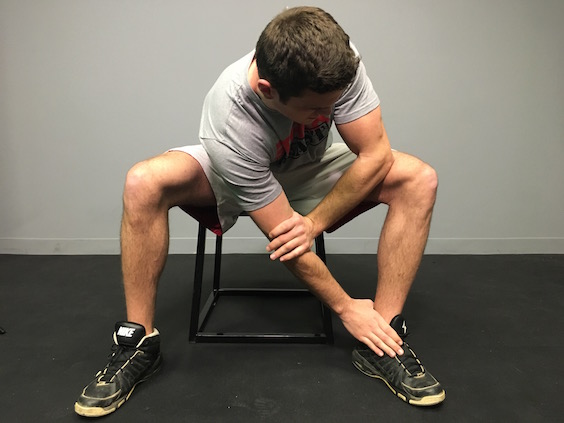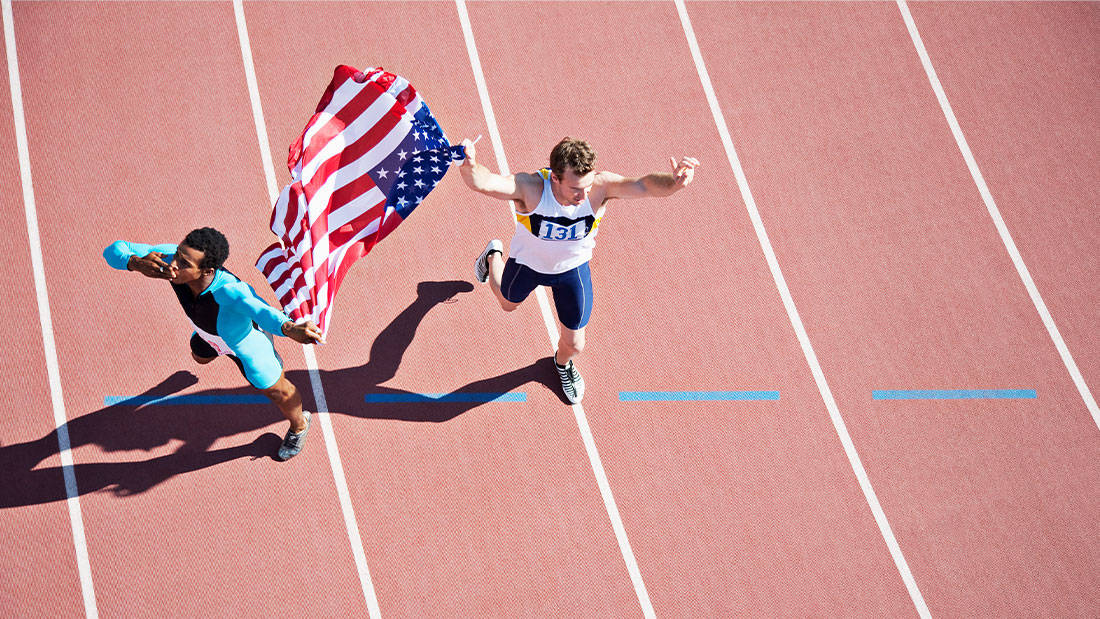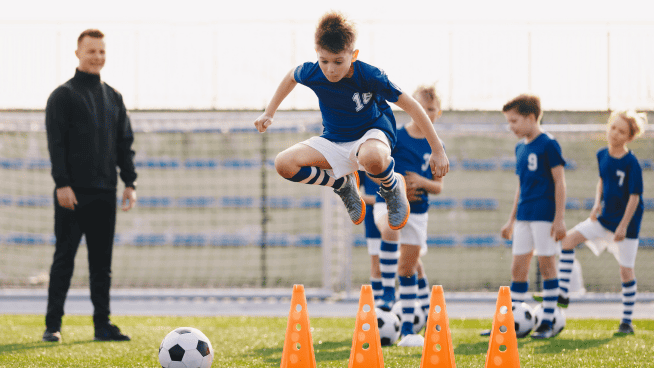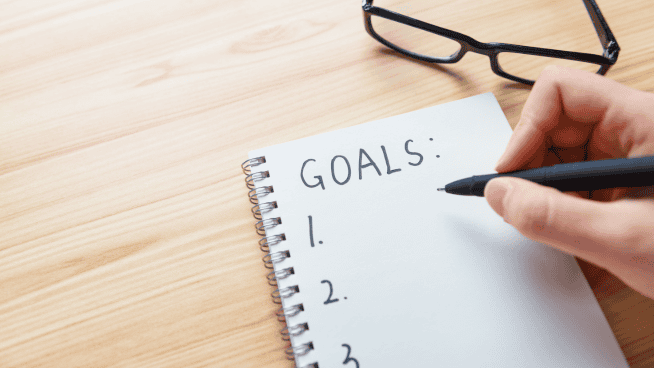How Athletes Can Develop A Mind-Body Connection
Things are happening beyond your consciousness that you cannot see, hear, or even feel. Often, situations and experiences unconsciously condition and program you through life, leading to poor health, diminished performance, or low energy levels. Your emotions, thoughts, and feelings affect your body in a good or bad way. In other words, your mind is very influential to your physical health. Therefore, being mindful is the key to connecting the mind and body. Training the brain to make the unconscious conscious produces the mind-body connection.
Training the brain to develop the mind-body connection requires these 3 things:
1) Perception
The ability to hear, see and feel to become aware through your senses. This leads to awareness.
2) Awareness
The ability to pay attention to or know something. This leads to mindfulness.
3) Mindfulness
Being fully present and conscious of what is happening and what you are doing. This leads to change.
These three things will help you to understand your reality. I like to say, mindfulness is bringing the unconscious into the conscious to understand or change something. It develops the ability to direct your attention where it needs or where you want it to be.
Breathing
Most people have a low perception of their breathing. You are involuntarily breathing; therefore, your mind slips away from your breath. You do not pay attention consciously to your inhalation and exhalation, whether it is shallow, deep, fast, or slow. Once you perceive and feel yourself breathing shallowly, you become aware of it to take deeper breaths. Being mindful of your breathing helps you adjust and change your breathing pattern.
Ways to Train Your Brain
The Dali Lama says, “Just one small positive thought in the morning can change your whole day”.
Mindfulness changes actions that lead to changing outcomes to formulate a better result. And so, you need to be mindful of what you do and understand why you do it and the consequences before you do it. For example, smokers are conditioned to smoke. They just do it habitually without thinking about any health consequences. Another example is when people run, they are not attuned to how they are breathing which creates fatigue, not permitting them to improve their running. Habitual poor conditioning severs the mind-body connection. Therefore, mindfulness needs to come from your own attention, perception, and awareness to change actions.
Become More Aware and Mindful
Being mindful is excellent to improve health, well-being, and performance. It helps you break away from conditioning and habits developed in the past that are disrupting the present.
Stress
Don’t stress. Learn to be relaxed and calm in situations. Stress narrows your thinking and makes you react without reason or intention. Stress in the mind tenses the body is leading to physical ailments.
Social Interaction
Understand how friends and certain people make you feel energetic. The Dalai Lama says, “Don’t let others or things around you destroy your inner peace”. It will definitely affect your mental and physical health.
Life
Be rid of unsatisfying things that make you unhappy and do things that make you feel good, happy, curious, and interested. Be mindful of negativity.
Get Off Auto-Pilot
Learn to smell the flowers when you walk by them, learn to breathe the fresh air when outside, learn to appreciate the day, or simply look at a beautiful mountain or the sky. Perceive and pay attention longer, and be more aware of your surroundings. Positive feelings open the door to heightened experiences. Get away from things like your TV, phone or computer.
Nutrition
Write down the things you eat each day and understand what is good and bad for you. Understand what you are eating and why you are eating it before you put it in your mouth. Many people just eat because it is fast and convenient and doesn’t care until they develop cardiovascular disease symptoms.
Breathing
Learning to focus on how you breathe is an excellent way to become mindful. Take time throughout your day to stop and take a few deep breaths if needed. Post notes around to remind you to check in on your breath if needed.
Meditation
Meditation does not have to be a one-hour-long session. You can meditate for 5 to 10 minutes a day to help you perceive and be more aware and mindful. Some athletes meditate for 10-15 minutes a day. If you do not like meditation, lay down and relax and listen to some relaxing music.
Athletics and the Mind-Body Connection
Slow it down in the gym.
Do slow functional movement training to be mindful of your movements by focusing on how far your muscles can stretch and contract and how your joints are moving. Understand your body awareness.
Video Record Yourself
Recording your movements when training or practicing can show you unconscious things that you may do that hurt your performance. For example, I record people doing an exercise to make them more aware of how they physically move. It helps them to visualize and understand more thoroughly and be mindful to do it correctly.
Visualize Playing Your Sport
Visualizing yourself scoring a goal or mentally practicing. This will enhance your performance! Visualization can increase ball movement and concentration. Visualize making a perfect soccer pass, a slap shot, sinking a free throw shot, or for a gymnast, or doing a floor routine review in your head.
Breath
Learn to slow down and relax your breathing during practice to incorporate during competition. This helps eliminate stress, and overreacting in a practice or a game, and saves energy.
Breathing and Training
Do slow movements where you have to inhale for 4 seconds, pause, and exhale for 4 seconds. You can use any total amount of seconds. This will connect your mind and breathing to your muscles stretching and contracting.
Tai Chi or Yoga
Develops and integrates strength, breathing, and movement flow.
Famous athletes who practice mindfulness and meditation
- Lionel Messi
- Cristiano Ronaldo
- Novak Djokovic
- Roger Federer
- Tom Brady
- Seattle Seahawks
- Kobe Bryant
- Michael Jordan
RECOMMENDED FOR YOU
MOST POPULAR
How Athletes Can Develop A Mind-Body Connection
Things are happening beyond your consciousness that you cannot see, hear, or even feel. Often, situations and experiences unconsciously condition and program you through life, leading to poor health, diminished performance, or low energy levels. Your emotions, thoughts, and feelings affect your body in a good or bad way. In other words, your mind is very influential to your physical health. Therefore, being mindful is the key to connecting the mind and body. Training the brain to make the unconscious conscious produces the mind-body connection.
Training the brain to develop the mind-body connection requires these 3 things:
1) Perception
The ability to hear, see and feel to become aware through your senses. This leads to awareness.
2) Awareness
The ability to pay attention to or know something. This leads to mindfulness.
3) Mindfulness
Being fully present and conscious of what is happening and what you are doing. This leads to change.
These three things will help you to understand your reality. I like to say, mindfulness is bringing the unconscious into the conscious to understand or change something. It develops the ability to direct your attention where it needs or where you want it to be.
Breathing
Most people have a low perception of their breathing. You are involuntarily breathing; therefore, your mind slips away from your breath. You do not pay attention consciously to your inhalation and exhalation, whether it is shallow, deep, fast, or slow. Once you perceive and feel yourself breathing shallowly, you become aware of it to take deeper breaths. Being mindful of your breathing helps you adjust and change your breathing pattern.
Ways to Train Your Brain
The Dali Lama says, “Just one small positive thought in the morning can change your whole day”.
Mindfulness changes actions that lead to changing outcomes to formulate a better result. And so, you need to be mindful of what you do and understand why you do it and the consequences before you do it. For example, smokers are conditioned to smoke. They just do it habitually without thinking about any health consequences. Another example is when people run, they are not attuned to how they are breathing which creates fatigue, not permitting them to improve their running. Habitual poor conditioning severs the mind-body connection. Therefore, mindfulness needs to come from your own attention, perception, and awareness to change actions.
Become More Aware and Mindful
Being mindful is excellent to improve health, well-being, and performance. It helps you break away from conditioning and habits developed in the past that are disrupting the present.
Stress
Don’t stress. Learn to be relaxed and calm in situations. Stress narrows your thinking and makes you react without reason or intention. Stress in the mind tenses the body is leading to physical ailments.
Social Interaction
Understand how friends and certain people make you feel energetic. The Dalai Lama says, “Don’t let others or things around you destroy your inner peace”. It will definitely affect your mental and physical health.
Life
Be rid of unsatisfying things that make you unhappy and do things that make you feel good, happy, curious, and interested. Be mindful of negativity.
Get Off Auto-Pilot
Learn to smell the flowers when you walk by them, learn to breathe the fresh air when outside, learn to appreciate the day, or simply look at a beautiful mountain or the sky. Perceive and pay attention longer, and be more aware of your surroundings. Positive feelings open the door to heightened experiences. Get away from things like your TV, phone or computer.
Nutrition
Write down the things you eat each day and understand what is good and bad for you. Understand what you are eating and why you are eating it before you put it in your mouth. Many people just eat because it is fast and convenient and doesn’t care until they develop cardiovascular disease symptoms.
Breathing
Learning to focus on how you breathe is an excellent way to become mindful. Take time throughout your day to stop and take a few deep breaths if needed. Post notes around to remind you to check in on your breath if needed.
Meditation
Meditation does not have to be a one-hour-long session. You can meditate for 5 to 10 minutes a day to help you perceive and be more aware and mindful. Some athletes meditate for 10-15 minutes a day. If you do not like meditation, lay down and relax and listen to some relaxing music.
Athletics and the Mind-Body Connection
Slow it down in the gym.
Do slow functional movement training to be mindful of your movements by focusing on how far your muscles can stretch and contract and how your joints are moving. Understand your body awareness.
Video Record Yourself
Recording your movements when training or practicing can show you unconscious things that you may do that hurt your performance. For example, I record people doing an exercise to make them more aware of how they physically move. It helps them to visualize and understand more thoroughly and be mindful to do it correctly.
Visualize Playing Your Sport
Visualizing yourself scoring a goal or mentally practicing. This will enhance your performance! Visualization can increase ball movement and concentration. Visualize making a perfect soccer pass, a slap shot, sinking a free throw shot, or for a gymnast, or doing a floor routine review in your head.
Breath
Learn to slow down and relax your breathing during practice to incorporate during competition. This helps eliminate stress, and overreacting in a practice or a game, and saves energy.
Breathing and Training
Do slow movements where you have to inhale for 4 seconds, pause, and exhale for 4 seconds. You can use any total amount of seconds. This will connect your mind and breathing to your muscles stretching and contracting.
Tai Chi or Yoga
Develops and integrates strength, breathing, and movement flow.
Famous athletes who practice mindfulness and meditation
- Lionel Messi
- Cristiano Ronaldo
- Novak Djokovic
- Roger Federer
- Tom Brady
- Seattle Seahawks
- Kobe Bryant
- Michael Jordan











